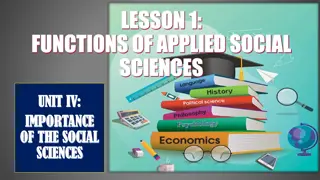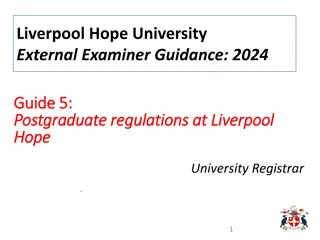Postgraduate Career Paths in Social Sciences
Postgraduates in Social Sciences have varied career paths, with a higher likelihood of employment and good earning potential. They aspire to roles in higher education, research, and teaching. This field offers opportunities both within academia and in diverse sectors such as finance, business, IT, and charitable work, indicating the versatility and demand for social science graduates.
Download Presentation

Please find below an Image/Link to download the presentation.
The content on the website is provided AS IS for your information and personal use only. It may not be sold, licensed, or shared on other websites without obtaining consent from the author.If you encounter any issues during the download, it is possible that the publisher has removed the file from their server.
You are allowed to download the files provided on this website for personal or commercial use, subject to the condition that they are used lawfully. All files are the property of their respective owners.
The content on the website is provided AS IS for your information and personal use only. It may not be sold, licensed, or shared on other websites without obtaining consent from the author.
E N D
Presentation Transcript
Careers and Careers and Employability Employability NWSSDTP Week 2021 Chair: Sue Heath (Manchester Institutional Lead)
Overview of session Overview of session What do social science postgraduate researchers do after their PhDs? Panel discussion with two former NWSSDTP postgraduate researchers: Dr Grant Collier Dr Leighann Spencer Overview of the resources available to you across NWSSDTP and forthcoming events
The basics The basics Overall levels of employment are higher for Doctoral graduates and Taught Masters graduates than for those completing an undergraduate degree by 11% and 6% respectively 87% of Doctoral graduates were earning 30k+, as compared to 43% of Taught Masters graduates, and 23% of those with an Undergraduate degree. Doctoral and Taught Masters graduates were more likely to agree that their current activity is meaningful , that they are utilising what they learnt in their studies and that their current activity fits with their future plans . Source: UKCGE Briefing paper Graduate Outcomes for Postgraduates 2017/18 , July 2020. http://www.ukcge.ac.uk/article/graduate-outcomes-17_18-policy-briefing-464.aspx
What do postgraduate researchers in What do postgraduate researchers in the social sciences aspire to do the social sciences aspire to do (more than one answer allowed) than one answer allowed)? ? (more Take up a career in higher education, primarily in the area of research and teaching (55.7%) A research-only career in higher education(35.0%) A research career outside of higher education (18.6%) A higher education teaching-only career(6.0%) Source: https://www.researchcghe.org/perch/resources/publications/ecrreport.pdf Early career social science researchers: experiences and support needs , 2018
Academics in and beyond the Academics in and beyond the academy academy In the UK and internationally, a higher proportion of social science PhD graduates remain in academia compared to other subject areas: 58 per cent compared with just under half of all PhD graduates. For those working outside of academia, slightly higher proportions of social science PhD graduates enter finance, business, IT and legal jobs (31%, compared with the 20% average for all PhD graduates. Around one-fifth of those outside the academy were employed in charitable or voluntary work (ibid). Source: Vitae 2020 data, cited in Tazzyman et al (2020) Review of the PhD in Social Sciences http://esrc.ukri.org/files/news-events-and-publications/news/review-of-the-phd-in-social-science/
What do employers want? What do employers want? Academic employers seek critical thinking skills, as well as skills in the interpretation and presentation of quantitative and qualitative data. Non-academic employers also value critical thinking, as well as the skills to formulate research problems and apply a range of methods and tools. There is a consensus in the literature that doctoral training does enhance the development of transferable skills, and that these are particularly valued by employers in non- academic sectors. PGRs believe that their training helps them to develop skills in problem-solving, thinking creatively, communication, innovation and leadership, skills also valued by employers. Source: Tazzyman et al (2020) Review of the PhD in Social Sciences http://esrc.ukri.org/files/news-events-and-publications/news/review-of-the-phd-in-social-science/
What sorts of careers and sectors do What sorts of careers and sectors do social science PhD graduates work in? social science PhD graduates work in? Postdoctoral fellowships University lectureships University research posts Local and central government social research Curators and archivists Commercial social research Market research NHS Trade unions Third sector Cultural sectors Consultancy/freelance Journalism Teaching Publishing Campaigning/lobbying Think tanks Policy work
Meet our panel Meet our panel
Support and resources for Support and resources for NWSSDTP PGRs NWSSDTP PGRs Careers Services at each of the 4 partner HEIs Partner-specific PGR schemes, eg Inclusive Leadership programme (UoM); Academia 101 (UoL); Careers ResearchTraining Programme (Lancaster) AHRC/ESRC DTPs joint careers event (Spring 2022) Summer School programmes, eg Keele PGR Summer School, Methods@Manchester summer schools (bursaries available)
Relevant sessions later this week Relevant sessions later this week ERSC-AHRC DTP Impact Event tomorrow at 10 Applying for an Overseas Institutional Visit Friday at 10 Applying for internships Friday at 12
Any questions? Any questions?























